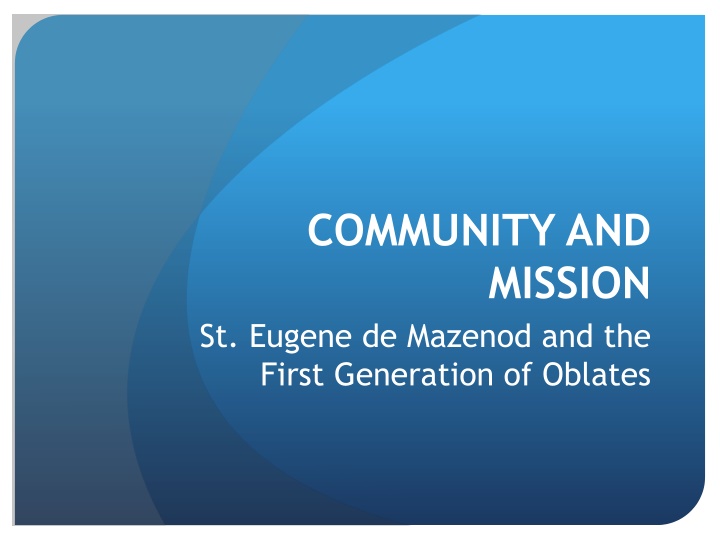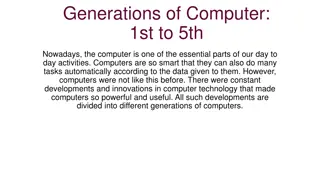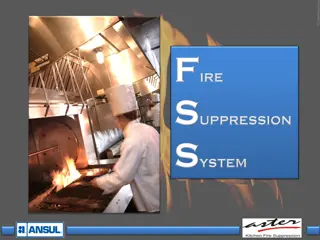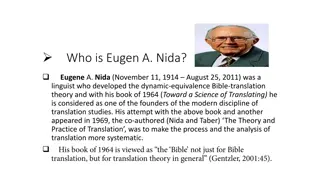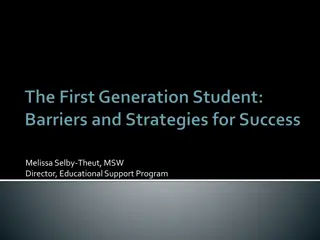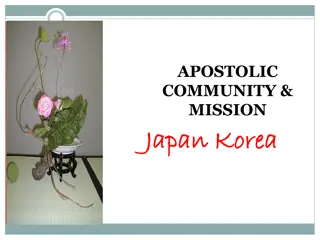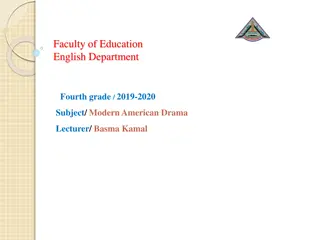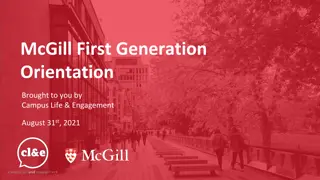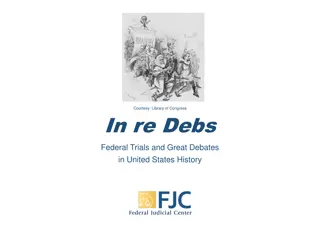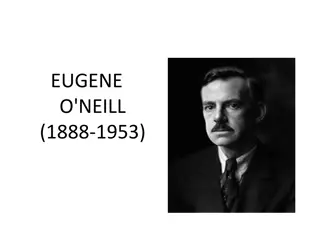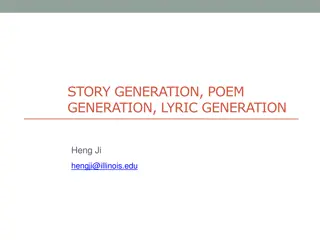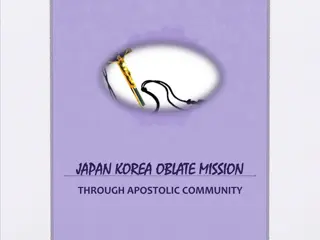St. Eugene de Mazenod and the First Generation of Oblates
St. Eugene de Mazenod had a vision in 1814 to organize a team of missionaries to evangelize Provence. His plan involved setting up a society of missionaries, emphasizing the importance of living in a regular manner. Through letters and collaborations with priests like Hilary Aubert and Father Tempier, St. Eugene aimed to form a group of zealous missionaries ready to work for the salvation of souls with dedication and selflessness.
Download Presentation

Please find below an Image/Link to download the presentation.
The content on the website is provided AS IS for your information and personal use only. It may not be sold, licensed, or shared on other websites without obtaining consent from the author.If you encounter any issues during the download, it is possible that the publisher has removed the file from their server.
You are allowed to download the files provided on this website for personal or commercial use, subject to the condition that they are used lawfully. All files are the property of their respective owners.
The content on the website is provided AS IS for your information and personal use only. It may not be sold, licensed, or shared on other websites without obtaining consent from the author.
E N D
Presentation Transcript
COMMUNITY AND MISSION St. Eugene de Mazenod and the First Generation of Oblates
COMMUNITY & MISSION St. Eugene & First Generation Oblates He had a plan which the Oblates found in his letters from 1814-1816. He had a plan of organizing a team of missionaries to evangelize his province of Provence. On October 28, 1814, he tells his friends that he is of two minds: either to go hide himself away in some well regulated community of an Order, to set up in the diocese of Aix a society of missionaries
COMMUNITY & MISSION St. Eugene & First Generation Oblates This second plan seems to Eugene to be the more useful of the two, given the dreadful plight to which the people have been reduced. He adds: The community, which in any event, only exists in my head, would be set up in my house... I also have in mind some rules to propose for I insist that we live in a completely regular manner.
COMMUNITY & MISSION St. Eugene & First Generation Oblates Letter One: to Hilary Aubert, a priest from Provence and director of the major seminary at Limoges, It is a matter of some priests banding together and continually preaching mission in all sectors of this vast diocese (of Aix) and surroundings... Ah! if we could form a nucleus, there would soon cluster around it the most zealous elements in the diocese... Oh! do not doubt that we will become saints in our Congregation, free but united by bonds of the most tender charity, by exact submission to the Rule we would adopt, etc... (Oblate Writings, Letters of Bishop de Mazenod, vol. 6, p. 3.)
COMMUNITY & MISSION St. Eugene & First Generation Oblates. Letter Two: to Father Tempier, assistant parish priest at Arle is dated October 9, 1815 Tempier in returned Eugene's letter, highlighting the features of the proposed project which made on Eugene a deeper impression on him . respond to
COMMUNITY & MISSION St. Eugene & First Generation Oblates. May God be blessed for having inspired you with a plan to prepare for the poor, for the people who live in the country, for those who are most in need of religious instruction, a group of missionaries who will go proclaim to them the truths of salvation... I perceive ... what it is you are seeking most of all when you choose your fellow-workers: you want priests... who are ready to walk in the footsteps of the apostles, to work for the salvation of souls without any other reward here on earth other than a great deal of toil and suffering. By the grace of God I feel within myself this desire, or if I do not have it, I deeply desire to have it and, with you, everything will become that much easier. So, you can count on me absolutely.
COMMUNITY & MISSION St. Eugene & First Generation Oblates. On the 15 of November 1815, Eugene thanks Father Tempier for his ready willingness and specifies: I count on you more than on myself for the regularity of a house which, in my mind and my hopes, must reproduce the perfection of the first disciples of the apostles. I base my hopes on that much more than on eloquent discourses.
COMMUNITY & MISSION St. Eugene & First Generation Oblates On December 14, 1815 he added: Know that you are necessary for this mission work... if you wish, of winning souls for God without taking much trouble to be men of interior life, truly apostolic men; I think it would not be difficult to replace you. But can you believe I want merchandise of that sort? We have of a priest who thinks as you do about the interior life of our community... (Spiritual strength of the Community).
COMMUNITY & MISSION St. Eugene & First Generation of Oblates. Thus, the first letters already highlight that Eugene wanted in a powerful way a well regulated community of priests with one heart and one soul, who, burning with a great love of Christ and of the Church, reproduce the perfection and the zeal of the apostles to evangelize the poor, specially by preaching missions.
The Rule of 1818 The first article of the 1818 Rule summarizes all these themes: The purpose of the Institute is to form a group of diocesan priests who live together (as brothers) and who strive to imitate the virtues and the examples of our Lord Jesus Christ, mainly by spending their time preaching the word of God to the poor. Then, too, the Preface to the Rule began with these words: If priests, to whom the Lord has given the desire to come together in community to work more effectively for the salvation of souls and for their own sanctification, wish to accomplish some good in the Church, etc.
The Rule o f 1818 The first part of the Rule sets forth the means suggested to work for the salvation of souls and the second sets forth the sanctification of the missionaries. means necessary for the The second part of the Rule, Special obligations, the Divine Office is recited in common; mental prayer is in common twice a day as well as the examinations of conscience. In addition, the community meets regularly to treat of internal affairs; the theological conference and the reading of the Constitutions.
The Rule of 1818 If we examine these articles of the Rule in the light of Founder's letters, the importance of community is beyond any doubt. Oblates seek sanctity together, pray together, do the work of evangelisation together. Added to this Divine Office which all Oblates must recite in common. The whole second part of the Rule makes explicit the communitarian striving towards perfection so that ministry, which also carried out in community, should be by the blessing of God, become fruitful. The Institute considers this exercise as the source of all blessings which are to be poured over the entire holy ministry in length and breadth of the Society (Rule 1818, p. 41).
The Rule of 1818 The community as the Founder wanted it had as its immediate goal the patterning of oneself on the saints, especially by the practice of the religious life and of fraternal charity. Father de Mazenod was happy to see that his first disciples were making serious efforts to be regular and charitable and did succeed in forming communities which were truly abodes of the blessed while at the same time never losing sight of the salvation of souls. (A letter to diocesan priest, Father Viguier, dated January 6, 1819, gives a good summary of all these aspects).
COMMUNITY & MISSION St. Eugene & First Generation Oblates The legacy St. Eugene and his first disciple left: Regular Communities: that his sons live in community in order to more surely sanctify themselves and to evangelise in a more effective manner. Charitable missionaries will be united in bonds of deep charity. In his family, he wanted to see relived the life of the Apostles and of first Christians. Fraternal charity and sharing were main points. communities. communities: Eugene had written, This forms fraternal
COMMUNITY & MISSION St. Eugene & First Generation Oblates Apostolic communities: The Congregation founded by St. Eugene de Mazenod has his special goal the evanglisation of the poor. The Founder never forgot it and always reminded his sons of this. The Oblates evangelised, as a general practice, did as a community. Final Legacy he left behind: As he lay dying he left his Oblates a final statement: among yourselves Charity, charity, charity: in the world zeal for souls!
COMMUNITY & MISSION Eugene & his first disciples left behind Father Joseph FABRES (1861-1892): It is leitmotif (theme song) which from now on will characterise the Oblate Community: charity among the members will create a true community, zeal outside will make of it an apostolic community. Mgr. Augustine DONTENWILL (1908-1931): We are religious first, then missionaries, and we must be fervant religious in order to be and remain fervant missionaries
COMMUNITY & MISSION Eugene & his first disciples left behind Father Leo DESCHATLETES (1947-1972) Within our own communities, our spirit of Oblation becomes a spirit of charity. We are religious living in community life, devoted to the apostolate and to the missionary life. Ours at the same time a contemplative and active life. In virtue of our vocation we are contemplative missionaries. active contemplatives We are MISSIONARIES to EVANGELISE the POOR according to the URGENT NEEDS OF THE CHURCH AND OF THE WORLD in APOSTOLIC COMMUNITIES.
COMMUNITY & MISSION Eugene & his successive disciples Father Richard HANLEY (1972-1974) All renewal of community must be mission oriented. We must never forget that revitalising our community cannot be divorced from their apostolic function as living cells for the a formation of communities on a broader front both in the church and in the world. The apostolic community is a response to the world s cringing search for community.
COMMUNITY & MISSION Eugene & his successive disciples Father Louis Lougen (2010 - ) Triennium aim: to fan the flame of the Oblate life and mission in anticipation of the 36thGeneral Chapter that will be held in 2016 and which will coincide with the 200thAnniversary of the Foundation of the Oblate Congregation. to review our lives in light of the conclusions of 35th General Chapter and to recommit ourselves to the call and the vision that inspired Saint Eugene de Mazenod to form the Missionaries of Provence in 1816.
OBLATE COMMUNITY to be community of the Apostles CCRR & General Chapters It has been said that the missionaries ought, as far as human nature allows, to imitate everything the example of Jesus Christ our Lord, the chief Founder of our Congregation, and Apostles, our first Fathers (CCRR 1928, art. 287) that of the holy
APOSTOLIC COMMUNITY Our Founder, St. Eugene de Mazenod constantly returned to the apostolic sources, in his writings: he never ceased to invite his Oblate brothers to walk in the Apostles footsteps , in the footsteps of those whom he (St. Eugene) called our first fathers . Community life is not only necessary for the mission, it is itself mission (Missionaries in Today s World, no. 109).
APOSTOLIC COMMUNITY In community we practise the evangelical counsels, we pray and accomplish our mission. We fulfil our mission in and through the community to which we belong. Our communities, therefore, are apostolic in character. It is in these communities and through them that we accomplish our mission. By our very vocation we are called to walk in the footsteps of the Apostles, Our first Fathers, and like them, to leave to follow Jesus in his mission. This is Apostolic Spirituality! (Missionaries in Today s World, General Chapter 1986, no. 116).
CONCLUSION Apostolic Community A missionary is not a silent witness. Community has an apostolic orientation. Jesus set up around his person a community of disciples to found a new Israel (1972 General Chapter on Community ). When speaking about apostolic community Mother Theresa said that: "A life not lived for others is not a life. "I can do things you cannot, you can do things I cannot; together we can do great things." "Live simply so others may simply live.
CONCLUSION Apostolic Community The Synod of the New Evangelisation had asked the religious to be witness of the humanising power of the Gospel through a life of brotherhood. The fraternal community has an enormous power to call people together. Sometimes living fraternally is difficult, but if it is not lived it is not productive. Work, even that which is apostolic can become and escape from fraternal life. If a person cannot live brotherhood he cannot live religious life. (Pope Francis to USG)
CONCLUSION Personal exclusively but collective, communitarian. Unity is superior to conflict. It is the willingness to face conflict head on, to solve it and to make it a link in the chain of a new process. (Evangeli Gaudium, nos. 226-230). fulfilment individual is never undertaking, an
